The Women on the Roof is a 1989 Swedish film written and directed by Carl-Gustav Nykvist. It stars Amanda Ooms and Helena Bergström. It was entered into the 1989 Cannes Film Festival. At the 25th Guldbagge Awards, Stellan Skarsgård won the award for Best Actor. The film was selected as the Swedish entry for the Best Foreign Language Film at the 62nd Academy Awards, but was not accepted as a nominee.
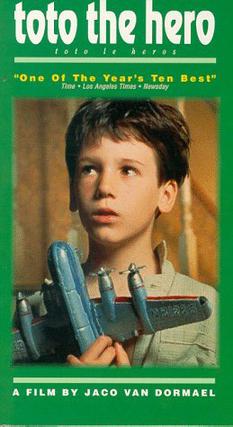
Toto the Hero is a 1991 Belgian film by Belgian film director and screenwriter Jaco Van Dormael. It won the Caméra d'Or award at the Cannes Film Festival in 1991, and the César Award for Best Foreign Film in 1992. The film was selected as the Belgian entry for the Best Foreign Language Film at the 64th Academy Awards, but was not accepted as a nominee.
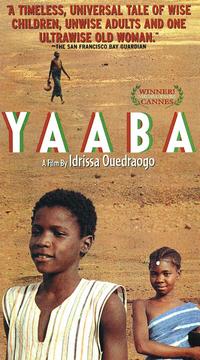
Yaaba is a 1989 Burkinabé drama film written, produced, and directed by Idrissa Ouedraogo, "one of the best known films from francophone sub-Saharan Africa". It won the Sakura Gold prize at the 1989 Tokyo Film Festival. The film was selected as the Burkinabé entry for the Best Foreign Language Film at the 62nd Academy Awards, but was not accepted as a nominee.

The Eighth Day is a 1996 Franco-Belgian comedy-drama film that tells the story of the friendship that develops between two men who meet by chance. Harry, a divorced businessman who feels alienated from his children, meets Georges, an institutionalised man with Down syndrome, after Georges has escaped from his mental institution and is nearly run over by Harry. The film was selected as the Belgian entry for the Best Foreign Language Film at the 69th Academy Awards, but was not accepted as a nominee.

Gabbeh is a 1996 Iranian film directed by Mohsen Makhmalbaf. It was screened in the Un Certain Regard section at the 1996 Cannes Film Festival. The film was selected as the Iranian entry for the Best Foreign Language Film at the 70th Academy Awards, but was not accepted as a nominee.

Cinema of Belgium refers to the film industry based in Belgium. Belgium is essentially a bi-lingual country divided into the Flemish (Dutch-speaking) north and the French-speaking south. There is also a small community of German speakers in the border region with Germany. Belgium is further a federal country made up of three regions and three language communities . Due to these linguistic and political divisions it is difficult to speak of a national, unified Cinema of Belgium. It would be more appropriate to talk about Flemish or Dutch-language cinema of Belgium and Walloon or French-language cinema of Belgium.

The Family is a 1987 Italian film directed by Ettore Scola and starring Vittorio Gassman, Fanny Ardant, Philippe Noiret, and Stefania Sandrelli. It was entered into the 1987 Cannes Film Festival.
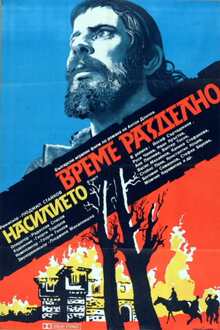
Time of Violence is a 1988 Bulgarian film based on the novel Time of Parting by Anton Donchev. It consists of two episodes with a combined length of 288 minutes. It premiered at the 1988 Cannes Film Festival where it was screened in the Un Certain Regard section. The film was selected as the Bulgarian entry for the Best Foreign Language Film at the 62nd Academy Awards.

The Warrior's Heart is a 1992 Norwegian film, directed by Leidulv Risan and starring Anneke von der Lippe, Peter Snickars, Thomas Kretschmann, Bjørn Sundquist and Iren Reppen. It was screened out of competition at the 1992 Cannes Film Festival. The film was selected as the Norwegian entry for the Best Foreign Language Film at the 65th Academy Awards, but was not accepted as a nominee.
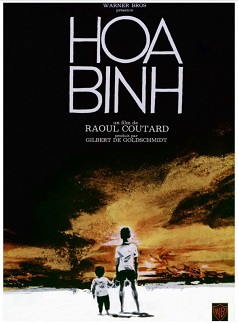
The Bamboo Incident or Hoa-Binh is a 1970 French film directed by Raoul Coutard and based on a novel La colonne de cendres by Françoise Lorrain.

Western is a 1997 road movie directed by Manuel Poirier. The film was selected as the French entry for the Best Foreign Language Film at the 70th Academy Awards, but was not accepted as a nominee.

The Castle is a 1968 West German film directed by Rudolf Noelte and starring Maximilian Schell, Cordula Trantow, Trudik Daniel and Helmut Qualtinger. It is based on the 1926 eponymous novel by Franz Kafka. The film won two German Film Awards. It was chosen as West Germany's official submission to the 44th Academy Awards for Best Foreign Language Film, but did not manage to receive a nomination. It was also listed to compete at the 1968 Cannes Film Festival, but the festival was cancelled due to the events of May 1968 in France.
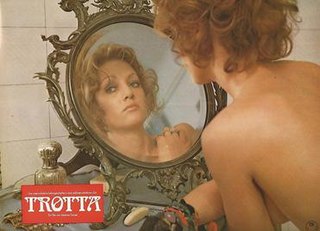
Trotta is a 1971 West German film directed by Johannes Schaaf. It is based on the 1938 novel Die Kapuzinergruft by Austrian author Joseph Roth. It was chosen as West Germany's official submission to the 45th Academy Awards for Best Foreign Language Film, but did not manage to receive a nomination. It was also entered into the 1972 Cannes Film Festival.
Like Two Drops of Water is a 1963 Dutch drama film directed by Fons Rademakers. It is an adaptation of the 1958 novel The Darkroom of Damocles by Willem Frederik Hermans. It was entered into the 1963 Cannes Film Festival and was selected as the Dutch entry for the Best Foreign Language Film at the 36th Academy Awards, but was not accepted as a nominee.
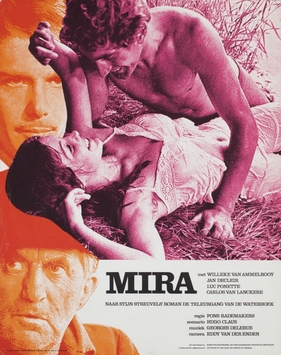
Mira is a 1971 Dutch-Belgian drama film directed by Fons Rademakers, based on the novel De Teleurgang van den Waterhoek by Stijn Streuvels. It was entered into the 1971 Cannes Film Festival. The film was selected as the Dutch entry for the Best Foreign Language Film at the 44th Academy Awards, but was not accepted as a nominee. The film was one of the highest-grossing Dutch films of 1971 with a gross of $1.3 million from Belgium and the Netherlands.
Woman Between Wolf and Dog, also known as Woman in a Twilight Garden is a 1979 Belgian-French drama film directed by André Delvaux. It was entered into the 1979 Cannes Film Festival and received the André Cavens Award for Best Film by the Belgian Film Critics Association (UCC). The film was also selected as the Belgian entry for the Best Foreign Language Film at the 52nd Academy Awards, but was not accepted as a nominee.

The Cannibals is a 1988 Portuguese drama film directed by Manoel de Oliveira. It was entered into the 1988 Cannes Film Festival. The film was selected as the Portuguese entry for the Best Foreign Language Film at the 62nd Academy Awards, but was not accepted as a nominee.
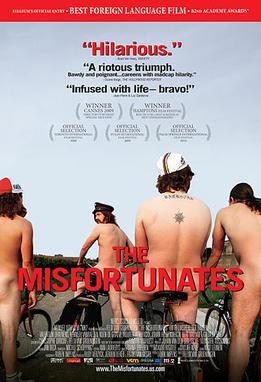
The Misfortunates is a 2009 Belgian comedy-drama film directed by Felix Van Groeningen. It is adapted from the 2006 semi-autobiographical novel of the same name by Belgian writer Dimitri Verhulst. The film stars Kenneth Vanbaeden, Valentijn Dhaenens, Koen De Graeve, Wouter Hendrickx, Johan Heldenbergh, Bert Haelvoet, and Gilda De Bal.
Rubens is a 1977 Belgian drama film directed by Roland Verhavert. The film was selected as the Belgian entry for the Best Foreign Language Film at the 50th Academy Awards, but was not accepted as a nominee.
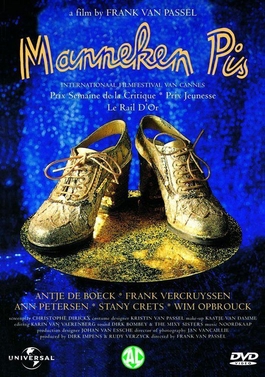
Manneken Pis is a 1995 Belgian comedy-drama film directed by Frank Van Passel and written by Christophe Dirickx. It premiered in May 1995 at the Cannes Film Festival. It received the André Cavens Award for Best Film and four awards at the Joseph Plateau Awards. The film was selected as the Belgian entry for the Best Foreign Language Film at the 68th Academy Awards, but was not accepted as a nominee.
















